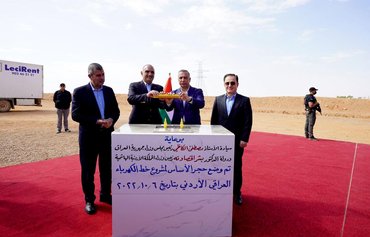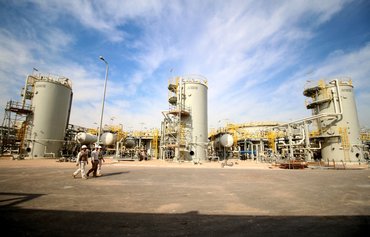The Iraqi government has been working towards increasing the country's electricity and natural gas production capacity and distribution networks as part of a strategy to improve the sector and move towards energy independence.
The ultimate goal is to strengthen Iraq's sovereignty by reducing its reliance on energy imports, as well as to diversify and strengthen its economy, participants at the recent "Powering Iraq" conference heard.
Representatives from government ministries and local and international companies took part in the July 10th and 11th conference in Baghdad, sponsored by the Ministry of Electricity.
Oil Minister Thamer Ghadban described Iraq’s strategic plan to develop energy and productive industry projects, saying this involves "attracting investment and optimising the use of advanced technologies".
![Iraqi lawmakers join representatives of local and international companies at the 'Powering Iraq' conference in Baghdad on July 10th and 11th. [Photo courtesy of the Ministry of Industry and Minerals]](/cnmi_di/images/2019/07/31/19191-Iraq-conference-energy-600_384.jpg)
Iraqi lawmakers join representatives of local and international companies at the 'Powering Iraq' conference in Baghdad on July 10th and 11th. [Photo courtesy of the Ministry of Industry and Minerals]
A roadmap has been prepared to ensure the provision of electricity, increase energy production and improve transportation and supply systems, according to Minister of Electricity Luay al-Khateeb.
This will be done with the help of international contractors, he said, noting that the plan also will focus on "opening the door for investment in renewable and environmentally friendly energy".
Exchanging ideas
Government and international representatives exchanged ideas and discussed the mechanisms of co-operation "in order to secure a bright future for the industry sector in Iraq", said Electricity Ministry spokesman Musab al-Mudarris.
"During the conference, the ministry unveiled its future plans and vision to increase its production capacity of electricity supplies and development of supply and distribution lines and systems," he told Diyaruna.
"We delivered an integrated presentation of our efforts with international companies, which generated 3,500 megawatts of electricity and drove the overall national output to 18,500 megawatts," al-Mudarris said.
"We plan on adding 11,000 megawatts to the national grid over the next four years by building new production plants and incorporating smart grids," he said.
The ministry also has begun to prepare the first round of investment licenses for solar energy projects, he added.
But the electricity sector is "still facing challenges regarding infractions that overburden the grid and cause wasted energy that could reach up to 60% of production levels", al-Mudarris said.
"We seek to limit these violations by activating monitoring operations and spreading awareness and a culture of energy saving consumption," he added.
'Powering Iraq'
The Powering Iraq website [ https://poweringiraq.com/ ] sets out the conference's goals and programmes, as well as ways to overcome the challenges to improving electricity supplies.
"The new website allows us to directly and quickly communicate with local and international companies to invite their representatives to workshops and meetings," al-Mudarris said.
The website is "a key platform for presenting investment opportunities and receiving proposals and requests from company representatives to take part in energy investment opportunities", he noted.
The Powering Iraq conference sought to address fuel shortages, one of the most challenging issues of electricity production, as the government currently relies on importing Iranian natural gas at a monthly level of 28 million cubic metres.
The government also directly purchases 1,300 megawatts of Iranian electricity.
"Access to electricity that is available 24 hours per day, every day, will power Iraq’s economic diversification and create the conditions for long-term growth," US Ambassador Matthew Tueller said in a keynote speech at the conference.
Powering Iraq demonstrates Iraqi Prime Minister Adel Abdul Mahdi's commitment to increasing natural gas and electricity production, he said, adding that this makes sense economically and from a geo-political perspective.
"Iraq and its people are blessed with abundant natural resources," he said. "If Iraq is fully energy independent, this will strengthen Iraqi sovereignty."
'Political crisis'
Iraq's electricity minister has indicated that the electricity shortage issue is first and foremost a political crisis, economist Salama Smeisim told Diyaruna.
This crisis is now "intertwined with the Iranian natural gas issue and sanctions imposed on that country", she said.
Solutions should address the importance of "creating a catalyst for attracting investment in the electricity and other energy sectors", Smeisim said.
Creating the right environment for investment includes removing obstacles in the way of development, she added, such as looking at ways to address the overly bureaucratic process and tackle issues such as corruption and bribery.
The ministries of electricity and oil are "on track with their investment plans", Iraqi oil expert Hamza al-Jawahiri told Diyaruna.
"Construction on five refineries is currently under way to produce natural gas that is associated with crude oil extraction," he said.
There are hopes that by 2021, Iraq will be able to meet its needs of gas to produce electricity rather than relying on imports, al-Jawahiri added.
He also pointed to Iraqi government efforts to minimise energy loss by laying underground electricity supply lines and improving the payment system for consumer electricity bills.

![Government and private sector representatives take part in the 'Powering Iraq' conference, held in Baghdad on July 10th and 11th. [Photo courtesy of the Iraqi Ministry of Electricity]](/cnmi_di/images/2019/07/31/19190-Iraq-Baghdad-conference-600_384.jpg)






